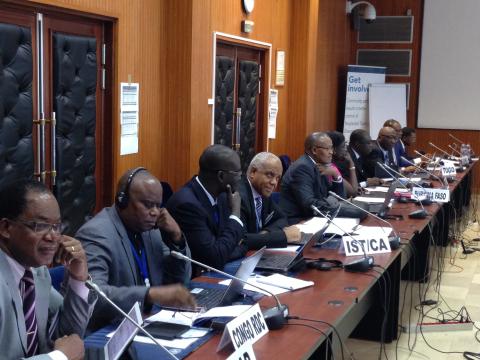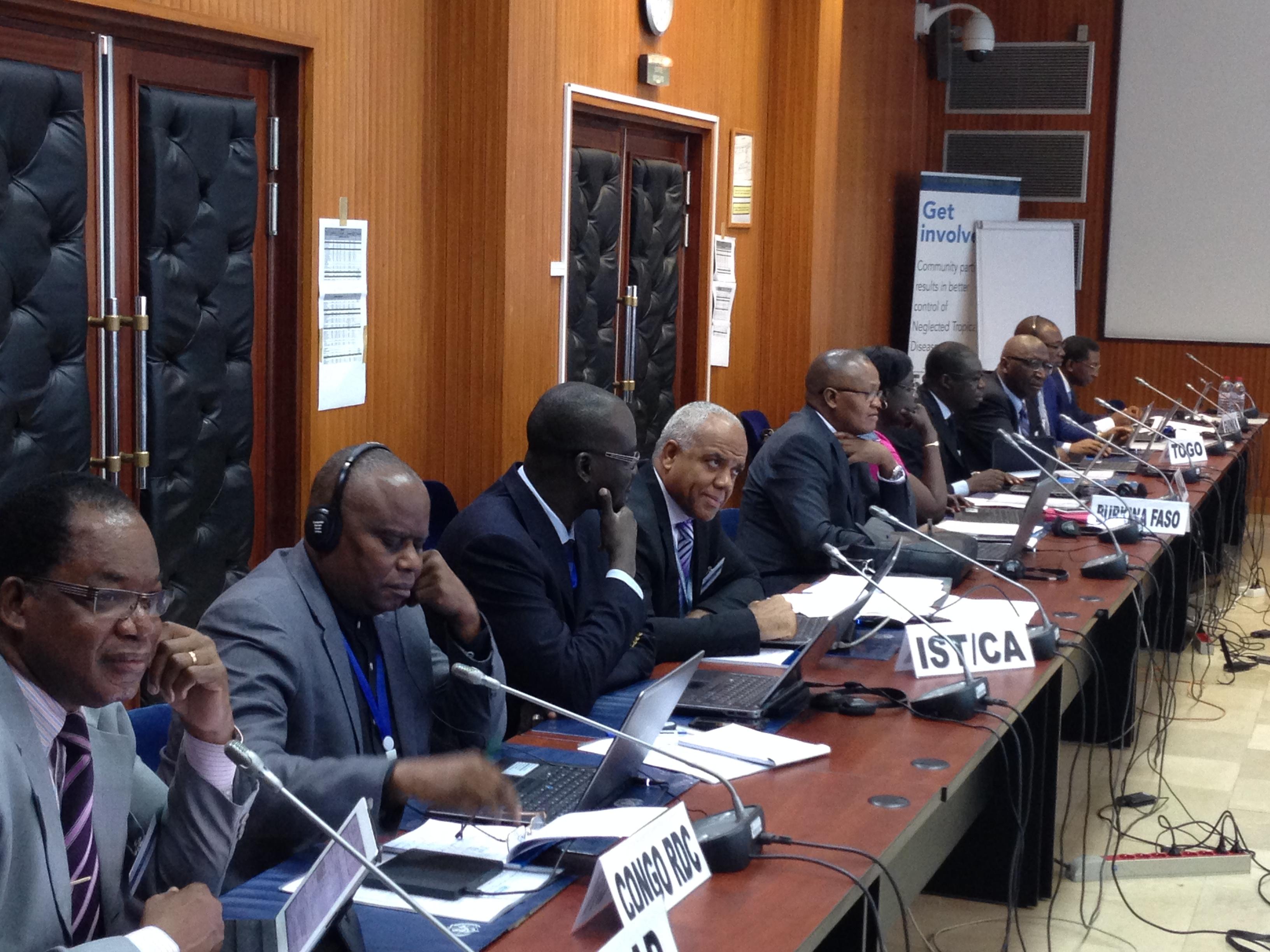
Since its inception in 2011, the EU-Luxembourg-WHO Universal Health Coverage Partnership has been supporting selected countries to strengthen policy dialogue on national health policies, strategies and plans (NHPSP) and Universal Health Coverage (UHC).
Among the 13 participating African countries, eight have also benefitted from additional technical assistance in the form of a health system strengthening (HSS) expert. In that context, issues such as a call for operational clarity have emerged, for example, on how HSS experts recruited under the UHC Partnership can best work alongside the national professional officers. In addition, experiences gleaned from the Ebola outbreak and other crises, such as the conflict currently faced in South Sudan, have brought unanticipated dimensions to the health policy dialogue.
Organized by WHO AFRO regional office, with the initial aim of providing orientation and guidance to some of the newly recruited HSS experts, a March 11-13 meeting in Brazzaville, Congo, ultimately turned into something much more powerful:
In this last year of phase II of the UHC partnership’s program, the internal WHO encounter became a unique opportunity for participating WHO offices from 10 African UHC Partnership countries to take stock of past achievements and lessons learned. It also allowed for discussion on the key aspects to be addressed for securing the continuity and possible extension of the program beyond its currently foreseen end in December 2015.
More efficiency, more credibility
Under the lead and guidance of WHO AFRO regional office, participants were invited to interact and discuss how to best improve program coordination and efficiency. One key issue addressed was how to align the work of HSS experts recruited under the UHC Partnership with the work of national officers within WHO country offices. Ultimately, participants agreed on a concrete set of actions, including, among others, the redefinition of roles and responsibilities between HSS experts and national officers so as to clarify the division of labor, as well as allowing for request-based country support from WHO AFRO, where needed.
The meeting also allowed for debate on lessons learnt, including the need for conceptual clarity on the terminology around “policy dialogue” and on how to harmonise the multiple policy dialogue structures. Participants highlighted that differences in the policy dialogue process at the national and the subnational levels needed to be acknowledged, along with the important role of ministries of health in leading the policy dialogue process.
Another notable meeting outcome was that all countries agreed to review, by March 31, their UHC partnership country roadmaps in consideration of what they view as realistically achievable in terms of expected roadmap results and targets to be reached before the end of the year. This is important for all countries but particularly for those affected by recent crises, such as South Sudan and the Ebola-affected countries in West Africa.
This exercise will also provide the basis for key financial adjustments to be made to UHC Partnership financing, in order to be able to better respond to countries’ actual needs – including through possible reallocations between country envelopes. In this context, countries will be invited to submit requests and justifications for additional technical assistance to WHO AFRO.
Showing the UHC partnership’s value for money
For many of the meeting’s participants, it seemed like a case of stating the obvious: Since the UHC partnership’s inception, the program contributed considerably to improving strategic health policy processes and documents at country level, to strengthening WHO’s visibility and leadership role within the policy dialogue and to a better understanding of the concept of UHC in the partnership countries, among many other notable results.
However, how does one demonstrate improvement? “What is the indicator for improved leadership, for example?” one participant asked, challenging Togo on the statements made in its UHC results chain presented during the meeting. In response, Togo made a successful case for its country programme results by explaining the causality between the UHC partnership’s facilitation of a better involvement of partners at district level, the resulting improved follow-up given to the implementation of district-plans, which ultimately led to better service provision and to significantly increased vaccination coverage and access to essential medicines rates in the two pilot intervention districts, between 2012 and 2014.
In sectors such as health, in other words, where results and impact can often only be seen in the long run and establishing direct attributions is sometimes difficult, it is important to highlight every step of the way by explaining how – step by step – small-scale achievements will ultimately contribute to results and impact in the long-run.
It is equally important to highlight that UHC partnership countries are necessarily moving at different speeds: While some, such as Moldova or Tunisia, have already made significant progress in advancing broader NHPSP agendas, others – notably the countries hardest hit by Ebola – will need to focus on implementing more specific health systems recovery plans in the short term.
In line with the above philosophy, participants concluded that the Brazzaville event in itself had led to three important outcomes: The agreement on a final revision round of country roadmaps and related financial – as well as TA – needs assessments by March 31; the agreement to work on a clear definition of roles and responsibilities between technical assistants and national WHO officers at country level; all partners’ commitment to improving results visibility in line with the range of methods presented during the meeting; as well as systematically documenting lessons learnt so far in implementing the policy dialogue programme.
